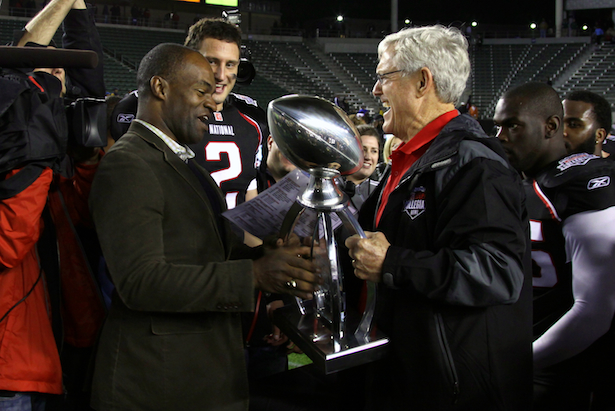NFLPA head DeMaurice Smith on MLK’s legacy, working with ESPN

(Kevin A. Koski/NFLPA)
 Martin Luther King Jr.’s legacy inspires DeMaurice Smith, Executive Director of the NFL Players Association (NFLPA).
Martin Luther King Jr.’s legacy inspires DeMaurice Smith, Executive Director of the NFL Players Association (NFLPA).
In 2009, in his first term with the NFLPA, Smith announced the organization’s $1 million pledge to the MLK National Memorial Project Foundation. Two years ago, to commemorate the MLK Day holiday, Smith wrote a column about what the civil rights leader means to him.
As Monday’s national holiday honoring MLK approaches, ESPN celebrates with content across many platforms. Honoring such history is a concept Smith, who visited ESPN last week, embraces.
“In the Players Association, we have a motto: ‘We stand on the shoulders of the people who came before us,’” Smith said. “When it comes to people like Dr. King, [and fellow civil rights activists] Ralph Abernathy and John Lewis, we truly know that all of us stand on the shoulders of the people who came before us.
Front Row asked Smith his thoughts on King’s legacy, the NFLPA Collegiate Bowl (Saturday, 6 p.m. ET, ESPN2) that serves as a showcase for pro football prospects and more during his visit to Bristol, Conn.
This year marks the 50th anniversary of Martin Luther King’s “I Have A Dream” speech. What does that milestone mean to you?
I grew up in Washington, D.C. My dad tells the story that my mother was pregnant with me on the day [Aug. 28, 1963] Dr. King gave that speech. She couldn’t go down and actually see the speech. So, there is that personal connection that you feel.
Both my mother and father were people who pulled themselves up from very tough spots, growing up in a Jim Crow South. I’m blessed that they were able to not only reach the 50th year anniversary of that speech but celebrate that anniversary in the second term of our President. It’s a deeply personal connection. We sometimes take so many things for granted in the sports world. . . Every now and then, I think it’s a good thing if we’re able to remember and focus on things that truly impact lives over generations.
What’s the thinking behind the NFLPA Collegiate Bowl?
Two things: We always have an interest in our young men who are going to transition into football and give them an opportunity to showcase their talents. But the second reason is, an equally important, is that we know that our players will do better if they get help on that transition from college into the pros.
So what we use the NFLPA game for is to not only showcase great players, but that entire week while they’re working out, they’re also spending time learning on what it means to be a professional in the National Football League. So it becomes a crash course on how to make sure your agent is working for you; how to take the best advantage of a financial advisor. . . .For those players who have not completed their degree, we’re going to introduce them to what we’re calling a “backbone system.” They’re going to get an introduction to how they can effectively work to complete their degree within three years.
How did you get ESPN involved in the game?
We reached out. Thankfully, we’ve had a great working relationship with ESPN for the last few years. We made a proposal to them to see if it would fit. We’re happy to be in a program that, for the next few years, we know where we’re going to be. That gives us an ability to grow and build together.
If you could make a documentary for ESPN Films, what would your topic be?
Easy. I’d pick our union leaders, [to show] that hereditary lineage between a Bill Radovich in the 1940s to a Kermit Alexander or John Mackey in the 60’s and 70’s to Sam McCullum in the 1980s, [former ESPN analyst] Bill Curry, going forward to Kevin Mawae, Drew Brees, Domonique Foxworth, [current ESPN NFL analyst] Brian Dawkins, Tony Richardson, Mike Vrabel. You’re talking about a group of men who throughout the ages sacrificed themselves for players they would never know. [When] we’re in a negotiation room and a guy like this speaks up, that’s the difference between winning and losing.







